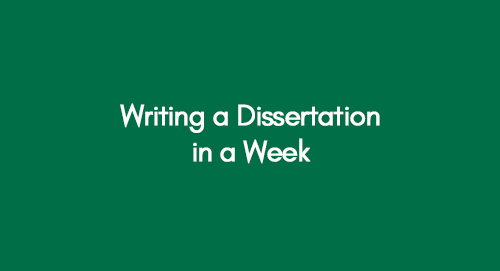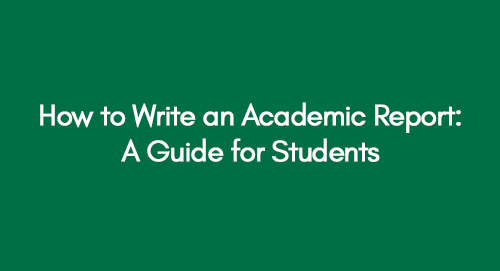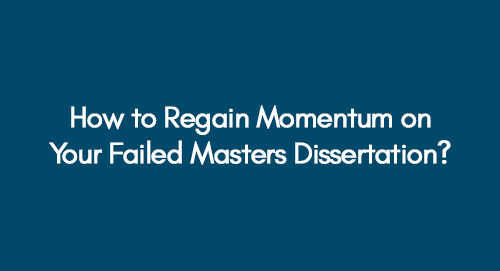
How to Write a Dissertation in a Week? | Key Steps and Helpful Tips
January 4, 2023
Crafting an Academic Report: An In-Depth Guide for Students
January 10, 2023If you are a student who has failed a master's dissertation, this article is for you. This blog will discuss how to handle a failed Masters's Dissertation. Writing a master's dissertation is no easy feat. It requires extensive research, critical thinking, and dedication. Unfortunately, even with the best intentions and hard work, some dissertations may go differently than planned. If this happens to you, don’t worry—you can get your dissertation back on track.
We will explain and provide some helpful steps that will equip you with the necessary tools and skill set needed to achieve success in getting your failed master's dissertation submitted successfully.
What are the reasons behind failed master’s dissertation?
Before discussing how to ace your dissertation after failing it, let's examine why things went north.
Poor Planning
One of the primary factors behind failed master's dissertations is poor planning. Too often, students underestimate the amount of time needed to complete a project like this, or they need to be made aware of all the steps that must be completed to achieve success.
Before starting your dissertation, it is important to map out a plan that includes all the tasks you need to do and when they should be accomplished. It is also beneficial to create a timeline for yourself to track your progress and stay on schedule.
Poor Thesis Statement
A thesis statement is one of the most important components of any dissertation since it guides the reader and the student throughout their journey. A weak thesis statement will lead to an unfocused paper that does not answer meaningful questions or provide useful insights about the topic at hand.
Therefore, it is essential for students to create a strong thesis statement that accurately reflects the research topic and serves as an effective guide throughout the entire process.
Check this post on "Getting Started With Your PhD Thesis: What to Do First."
Inadequate Knowledge of the Subject Matter
A poor understanding of the subject matter can also cause dissertations to fail because it prevents students from properly analyzing data or drawing relevant conclusions from their findings.
To ensure success, students should consult with professors or experts who are familiar with the subject matter before beginning their work on the dissertation. It will help them gain a better understanding of what kind of information they need to include in their papers and how they can use it effectively in their research work.
Unclear Research Questions
Another reason why many master's dissertations fail is that the student has not framed a clear research question or objective for their project. By articulating what exactly they are trying to answer with their research, it becomes easier for them to determine what data they need to collect to answer those questions or reach their objectives. Your research question should be concise yet thorough so that you can narrow down your focus and target relevant information to create a successful dissertation.
Check this guide on "How to pick the right type of research for your dissertation"
Lack Of Focus On Quality Writing
Finally, another major factor behind failed masters’ dissertations is the lack of focus on quality writing. Writing a dissertation requires strong writing skills, including grammar and spelling accuracy, as well as clarity and conciseness in arguments made throughout the document.
Additionally, citing sources accurately is essential for any academic writing piece, so ensure you are familiar with proper citation methods before beginning your work. With these tips in mind, you can ensure that your dissertation meets all expectations for quality writing set by your institution or advisor.
Check this guide on, "master dissertation writing"
Tips to modify your failed master’s dissertation
Accepting the Failure and Moving On
It’s hard to accept that you were not able to complete the dissertation in time or that it failed. You may feel embarrassed or ashamed, but it's important to remember that failure is part of the learning process. The sooner you accept it and move on, the better off you will be. Take some time to process your feelings and then devise an action plan for regaining momentum with your dissertation.
Assess the Situation
The first step in getting your dissertation back on track is to assess the situation. What led to it failing in the first place? Was it a lack of resources or support? Were there any challenges that you weren’t aware of when starting? Identifying these issues can help you understand what went wrong and prevent them from happening again in the future.
Start by Identifying Your Weaknesses
Once you have accepted the failure, identify any areas where you may have gone wrong or could have done better. It will help ensure that those same mistakes don't happen again when you retake your dissertation. Was there anything in particular that caused your downfall? Perhaps poor research skills or lack of organization? Pinpointing these weaknesses will help inform how best to approach your rewrite so that it succeeds this time around.
Re-evaluate Your Topic
If your topic may have been too broad or difficult for the scope of your dissertation, consider re-evaluating it. Take time to look at your original plans and goals for the project and think about whether or not they are still achievable within the parameters of your new topic. If necessary, seek advice from faculty members who can provide guidance on how best to proceed with a revised topic.
Reorganize and Reinvigorate
Once you've identified any weaknesses in your approach, reorganize and reinvigorate yourself around completing the project. Set realistic goals for each day of work - even if it’s just one page - so that at least something gets done each day towards completing the project. It will help build momentum and provide motivation as well as accountability for getting things done in a timely fashion.
Additionally, talk with a mentor or professor about what went wrong the last time around so they can offer advice on how best to approach rewriting your paper this time around. Their guidance could be invaluable!
Lastly, make sure that you are taking care of yourself - mentally, physically, and emotionally - during this trying period by taking regular breaks from work and engaging in activities outside of schoolwork like exercise or socializing with friends/family members so that burnout does not become an issue during the writing process again.
Conclusion
Writing a successful master’s dissertation is no easy feat – but if you follow these steps outlined above - accept failure and move forward; identify weaknesses; reorganize/reinvigorate; talk with mentors/professors - success should follow! It won't be easy, but it is definitely achievable if you stay committed throughout the writing process! Good luck!
The following resources will work wonders to gain the best grades in your dissertation.
Contact Premier Dissertations to ace your dissertation.
Get 3+ Free Dissertation Topics within 24 hours?


























